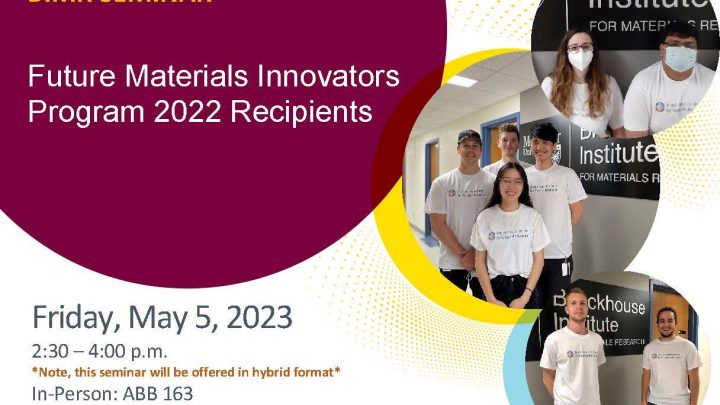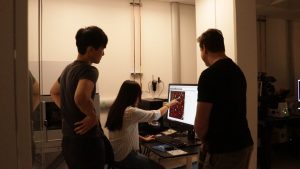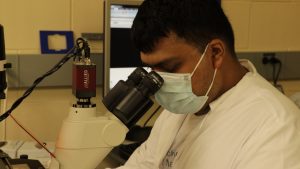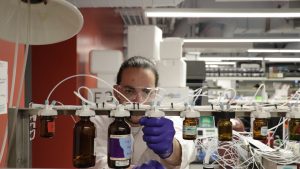BIMR Seminar: Future Materials Innovators Program 2022 Recipients
May 5, 2023
2:30PM to 3:30PM

Date/Time
Date(s) - 05/05/2023
2:30 pm - 3:30 pm
Categories
In-Person: ABB 163 – exceptionally!
Online: https://mcmaster.zoom.us/j/99275355093?pwd=amZZOWVpOENDZkhWbDRPZHNBT1B0Zz09
1- Fabrication of a bilayered single-walled carbon nanotube doped hydrogel waveguide material, by Billy Deng, Alex Ly, Dusan Srdic and Kevin Vaughan (Saravanamuttu and Adronov Research groups)
Our collaboration is focused on fabricating a soft material that can both direct light and conduct an electrical current. Using a photosensitive hydrogel, we can generate self-trapped beams of light and inscribe waveguides. Introducing a bilayered approach, where a carbon-nanotube doped polymer is used to encapsulate a hydrogel waveguide, our goal is to increase the conductivity of the hydrogel to develop a dual-functional material. The hydrogel waveguide will be a versatile interface that is both optically and electronically (i.e., optoelectronically) responsive, for use in nanoscale sensing, connections in fiber-optic cables as photodiodes, and bendable circuitry in biological applications.

2- Using correlative microscopy to investigate the influence of genetic modifications on the quantity and quality of magnetite crystals synthesized by magnetotactic bacteria, by Shariful Sakib and Alessandra Merlo (Grandfield and Fradin Research groups)
Magnetite nanocrystals synthesized by magnetotactic bacteria, given their purity and dimensions, are materials of interest in a great number of potential applications. The initial step towards the completion of our project requires the over-expression of Mms6, one of the key proteins responsible for the production of these nanocrystals, and the combined expression of a fluorescent tag fused to the protein to study Mms6 localization. Light and electron microscopy techniques will be employed to correlate the effects of this genetic manipulation on the production and characteristics of magnetite nanocrystals produced by the modified bacteria.

3- Building a machine learning model for designing blood-brain barrier crossing oligonucleotide drugs, by Joseph Maggisano and Rik Chuiko (Bujold and Ayers Research groups)
The blood-brain barrier (BBB) is a highly selective network of tissue and blood vessels that prevent toxic substances in the blood, but also therapeutics, from entering the brain to exert their effects. This challenge is especially pressing for biomolecule drugs because they are hydrophilic and lack the ability to traverse the lipid bilayers of cells composing the BBB. Consequently, the development of oligonucleotide-based therapeutics that can effectively cross the BBB remains a critical challenge in the treatment of neurological diseases. To address this, a machine learning (ML) model based on genetic algorithm has been built to design BBB-crossing oligonucleotide drugs, which show unparalleled promise for the treatment of neurological diseases with a genetic component. The model is trained on a dataset of experimentally measured BBB permeabilities of small molecule drugs, and the genetic algorithm is used to highlight important functional characteristics associated with BBB permeability. The output has helped guide the design of novel oligonucleotide-based drugs with tailored phosphate backbone modifications. To assess the impact of these functional groups on permeability, fluorescently labelled oligonucleotides were placed on a monolayer of endothelial cells embedded in a fibrin hydrogel. Relative oligonucleotide permeabilities were determined by measuring their fluorescence in the outlet channels, indicative of tissue permeability. The proposed approach will allow us to uncover structural parameters associated with BBB permeability, offering a potential solution for the development of new oligonucleotide-based therapeutics.

Followed by a BIMR Reception!
To celebrate the end of another successful Seminar Season with this last seminar, we are pleased to invite all our members to a Reception after the Future Materials Innovators Seminar. Join us to share a few appetizers and mingle with your colleagues.
Reception to follow the Seminar at our usual location just outside room ABB 102.

